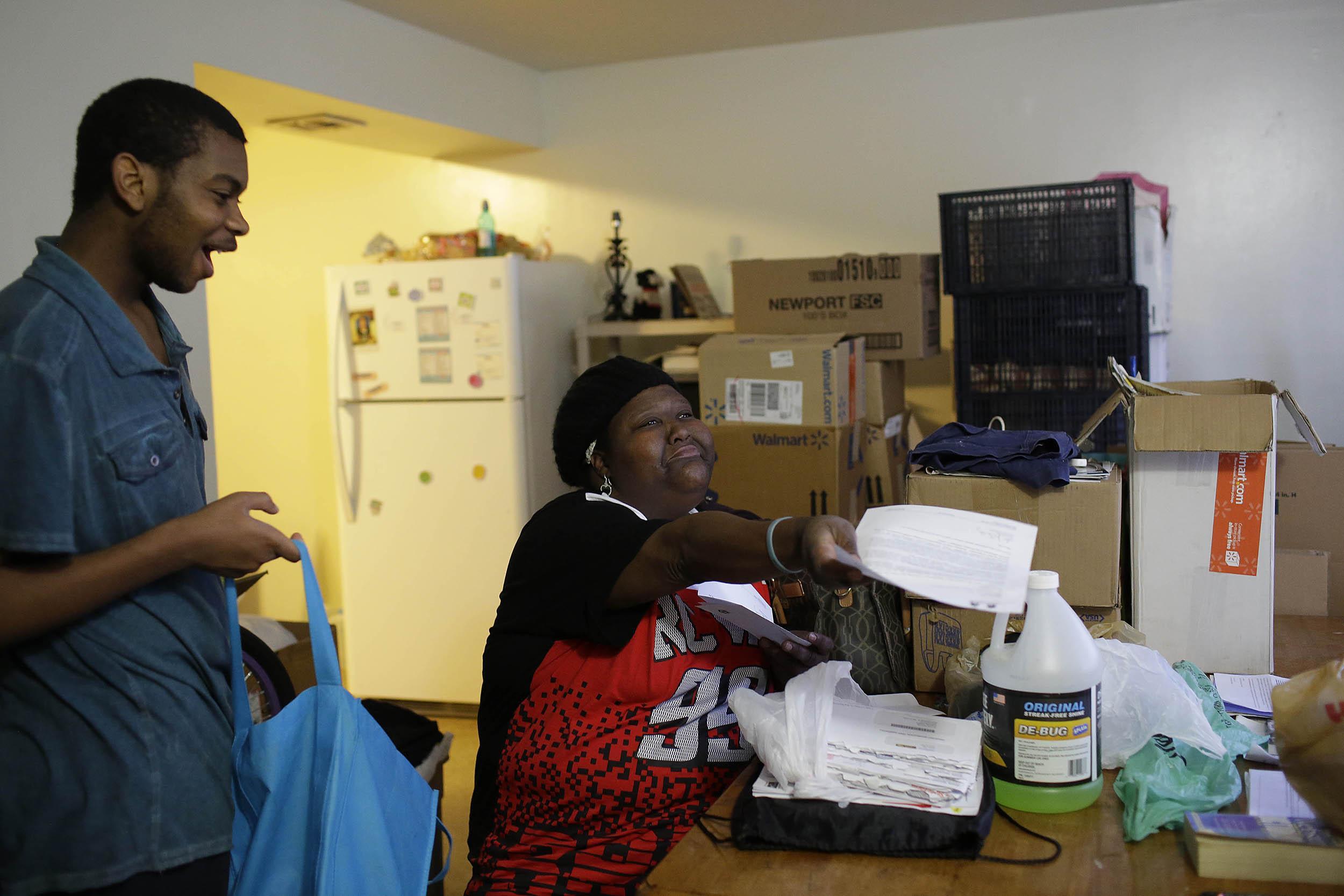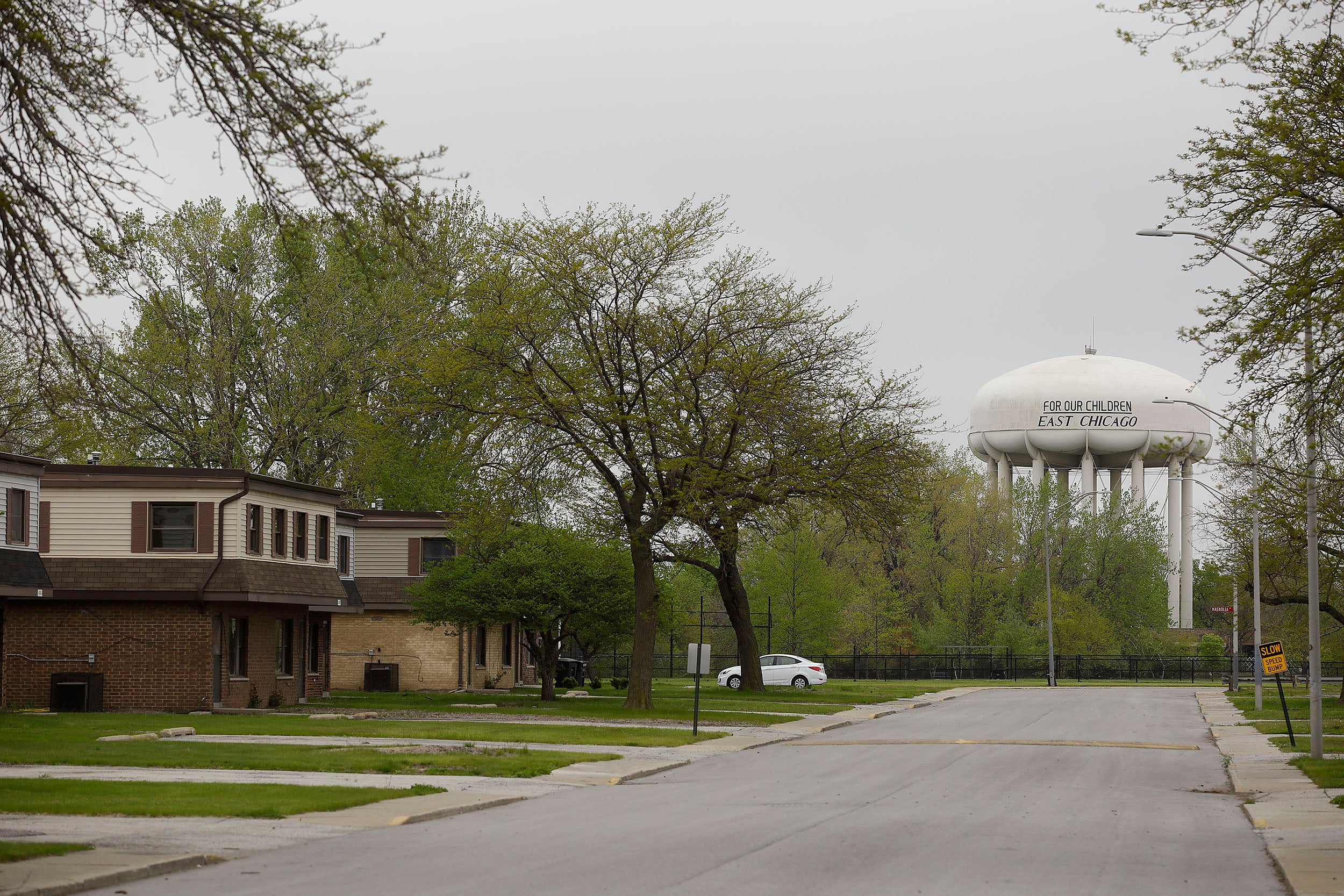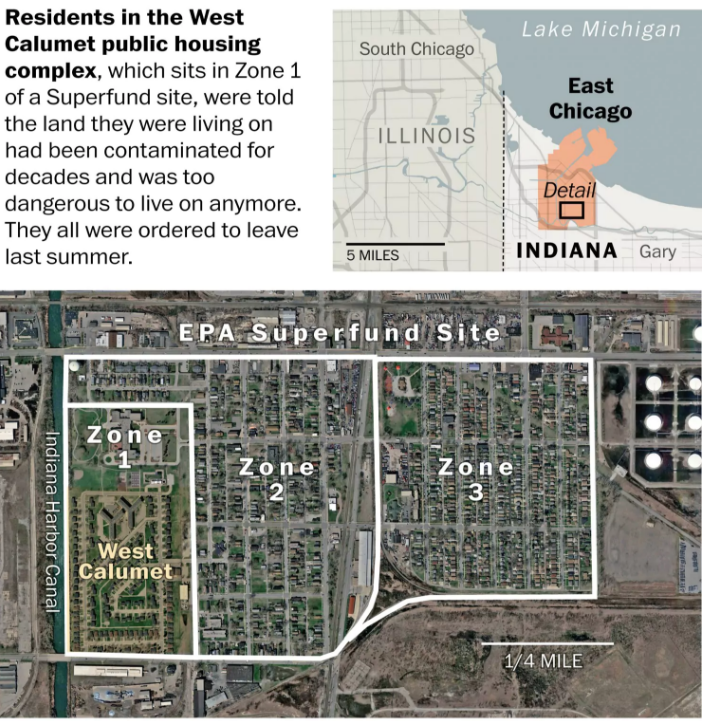Escaping one of the worst environmental disaster zones in the US
The mayor of East Chicago, Indiana, ordered everyone to leave a Superfund site one year ago. But for some, that wasn’t so easy

Your support helps us to tell the story
From reproductive rights to climate change to Big Tech, The Independent is on the ground when the story is developing. Whether it's investigating the financials of Elon Musk's pro-Trump PAC or producing our latest documentary, 'The A Word', which shines a light on the American women fighting for reproductive rights, we know how important it is to parse out the facts from the messaging.
At such a critical moment in US history, we need reporters on the ground. Your donation allows us to keep sending journalists to speak to both sides of the story.
The Independent is trusted by Americans across the entire political spectrum. And unlike many other quality news outlets, we choose not to lock Americans out of our reporting and analysis with paywalls. We believe quality journalism should be available to everyone, paid for by those who can afford it.
Your support makes all the difference.The smell of burning bacon stirred Demetra Turner from her makeshift bed on the floor, a stack of quilts the only padding between her body and the ground.
Long gone was her mattress, tossed into a dumpster with her couch, her recliner, her favourite theatre chairs, her kids’ beds. She had thrown them out on instructions from health officials, who said everything in the West Calumet Housing Complex was poisoned with arsenic and lead.
Everyone must move, Mayor Anthony Copeland said last August, because the land was too dangerous to live on. But now it was May, and Turner and her children were still trying to escape.
She shuffled past barren walls, packed boxes and cases of bottled water. “Who cooked that bacon?” Turner, 44, asked her 18-year-old son, Jeremiah. He sheepishly replied, “I did.”
She smiled and shook her head. He was just trying to help, she knew. Her overnight job at a gas station left her exhausted, and everyone in the family was desperate to find a new place to live.
In May 2016, Turner unknowingly moved her family into one of the nation’s worst environmental disaster zones. Last summer, shocked residents in the public housing complex called West Calumet were told that the soil in their yards had been contaminated for decades. In some places, the lead in the dirt measured 228 times the maximum level considered safe.
Subsequent blood tests found that 18 out of 94 children younger than 6, the age group most at risk, had elevated lead levels. Then officials tested the water and discovered that it, too, contained lead, raising concerns that East Chicago was becoming the next Flint, but worse.
Vice President Mike Pence was governor of Indiana at the time of the announcement a year ago that the neighbourhood was uninhabitable. He refused to grant East Chicago emergency status and did not visit, and his legal counsel wrote that Indiana had already provided adequate aid to East Chicago. (Pence’s office declined to comment for this report.)
Soon Turner was searching for a new place to call home in a region suddenly bombarded with far more demand for real estate than supply. An environmental crisis morphed into a housing crisis, and West Calumet became a national flash point, a cautionary tale about the Environmental Protection Agency’s underfunded cleanup program.

West Calumet and two nearby neighbourhoods were declared a Superfund site in 2009, but it took five years to secure the first round of cleanup funding – $26 million (£20.1m) – and the remaining money wasn’t collected until this March.
In April, EPA Administrator Scott Pruitt declared during a visit to East Chicago that places like West Calumet would be his top priority. During a 90-second statement at a news conference, he said he had come to “restore confidence” that the EPA was “going to get it right.”
Officials should “assess and make decisions and put the community first,” he said, adding that he was “taken” by his conversation with a few residents during the spring visit.
“The emotion, the passion was just telling,” Pruitt said.
Later, in an interview with The Washington Post, Pruitt criticised previous administrations for moving slowly and distributing fact sheets and warning signs. “How about cleaning it up? Pruitt said. “How about cleaning it up?”
At the end of July, Pruitt’s Superfund Task Force recommended creating a “top 10 list” of sites to prioritise. The administrator did not specify which sites, but mentioned East Chicago to reporters at EPA headquarters and called residents’ despair “heartbreaking”.
Ben Carson, secretary of Housing and Urban Development, which oversees the local housing authority, paid a visit this month. He acknowledged that West Calumet residents had been “inconvenienced” but said their relocations were “done in a good way.”
Of the hundreds of families who were ordered out of West Calumet last summer, Turner’s was one of the last to leave, dodging letters from housing officials threatening to ship her across state lines to Chicago. That was the city she fled a decade ago, where moms fear not dirt but bullets. She wanted to whisk her kids to safer ground but just couldn’t find any.
For decades, lawmakers and officials have been aware of the dangerous dirt beneath West Calumet.
The housing complex was built in the 1970s in the footprint of a demolished lead factory, beside an operating lead smelter cited for pollution, and parallel to a canal that feeds a waterway eventually named the most toxic in America. West Calumet children have been exposed to lead in the soil, water and air capable of damaging the developing brain.
At least four times over the past three decades, local leaders have asked the federal government to clean the area up. In 2009, the EPA added West Calumet and two neighbourhoods nearby to the National Priority Cleanup List through the agency’s Superfund program.
The EPA initially sampled some yards and removed “hot spots” – sections of dirt with the highest lead levels – while they formulated a more comprehensive plan. But extensive testing from 2014 to 2016 showed the contamination was far worse than initially realised. That data reached Mayor Copeland in the spring of 2016. He criticised the EPA for operating at a glacial pace and, a few months later, ordered the complex to be demolished.
All the while, federal, state and local officials did little to protect residents like Turner, who knew nothing of West Calumet’s history when she moved in last year. She said there was no lead disclaimer in her lease or warning signs posted on the property, an egregious result of poor communication between the EPA, the US Department of Housing and Urban Development and the East Chicago Housing Authority, according to housing and environmental advocates.

“It merely reflects the glaring lack of oversight and enforcement of existing housing and environmental laws,” said Debbie Chizewer, a Chicago-based attorney at Northwestern University’s Environmental Advocacy Clinic. “ECHA, the City of East Chicago and EPA all knew [about the lead] and did not act here to address this grave danger to this low-income community of colour.”
Turner’s old neighbourhood, at the harbour near Lake Michigan, was plagued by gang activity and more expensive than West Calumet.
In May of last year, she moved into a two-story, three-bedroom duplex within sight of the neighbourhoods’ baseball field, basketball court, playground and pool, all perks for Jeremiah and his 11-year-old sister, Makasha. The streets at West Calumet teemed with children, and neighbours hosted backyard barbecues and tended flower gardens. On the Fourth of July, everyone gathered to watch fireworks.
“It was life,” Turner said.
But in late July 2016, just as her family had unpacked and settled, EPA officials began planting alarming signs in the yards: “DO NOT PLAY IN THE DIRT OR THE MULCH,” they said in bold blue letters.
Because West Calumet had been their home only for a short time, the risk to Turner’s kids wasn’t as high as for children born there. Jeremiah’s blood tested below the CDC’s actionable threshold of 5 micrograms per deciliter, and Makasha was never tested.
Even so, Turner felt a bubbling resentment when she looked at the water tower outside her window, painted with words that seemed to mock them all. “EAST CHICAGO,” it reads. “FOR OUR CHILDREN.”
In no time, personal injury attorneys appeared, offering limo rides and steak dinners to potential clients. Turner brushed them off, wary of what she considered predatory tactics.
In August 2016, the EPA began deep-cleaning the walls and floors and vacuuming the furniture at homes across the complex. But th agency also encouraged residents to buy new furnishings after they moved, Turner said. She thought she would be out within weeks, so she started purging her things, dropping them into large blue dumpsters officials had placed outside.
Family photos went back into boxes. She instituted a new rule: Shoes come off at the door. And she placed an order online for a few dozen quilts that would become their sleeping “pallets.”

That August and September, the Department of Housing and Urban Development gave Turner and her neighbors Section 8 housing vouchers that low-income families can use to find homes in the private market. Copeland said the city provided on-site relocation assistance, contacted neighboring housing authorities and “did everything it could to assist those displaced by this unfortunate situation.”
But residents, many of whom regard the city’s Housing Authority and mayor with animosity, tell a different story. They say the Housing Authority distributed an outdated list of properties with landlords who refused to accept their vouchers, heightening their anxiety as the city pressured them to leave.
A housing discrimination complaint filed by Chicago lawyers on their behalf bought residents more time. HUD eventually settled and agreed, among other things, to extend their move-out deadline to at least April.
So Turner created profiles on every real estate website she could find – Zillow, HotPads, Trulio, Rent.com, Apartments.com, Section 8, Craigslist.
She struck out in East Chicago and transferred her housing voucher to the neighboring town of Whiting, and then Hammond, and then back to East Chicago, a laborious process that requires meetings and paperwork with each new housing authority.
Other neighbours moved to Chicago, but Turner had grown up and raised her children there – Jeremiah, Makasha and their four older brothers – and considered it too dangerous. “I moved out of Chicago to save them,” she said.
By May, Turner’s duplex was the only place on her street still showing signs of life – the only door with a welcome sign, only driveway with a car, only full trash cans at the curb. This exposed her family to yet another danger: burglars.
So Jeremiah, who spends most nights home alone with Makasha, started a new routine.
The teen would jam a chair under each door knob and stack others in front of the picture window. If someone tried to get inside overnight, Jeremiah reasoned, the toppling furniture would wake him so he could call police. It made him feel safer, he said.
Then the city cut power to the streetlights.
Twice, knocks on the door came late at night. Once, while Jeremiah was taking the garbage cans to the curb before bed, people in a car driving by shot at him with a BB gun.
Soon after, Turner came home from work to a heart-wrenching sight: Pillows and blankets were piled on the floor under the kitchen table, just feet from the front door, and Jeremiah was on guard but fast asleep.
It was a morning in mid-May when Turner came home and found the eviction notice.
She and her kids had less than a week to find a new place to live with her Section 8 voucher or relocate to city-provided temporary housing across town. If they refused, the letter said, they would be evicted and risk losing their voucher.
So in June, Turner finally drove her family away from the dangers of West Calumet forever, past her neighbours’ abandoned homes and the mocking water tower, toward a bug-infested unit that made her cry.
With a furniture stipend, she bought a new living room set and three beds, the family’s first real mattresses in a year. Then Turner plotted their final escape from East Chicago.
At the end of July, a week before her voucher was set to expire, she and the kids loaded up the moving truck again. They said goodbye to the only school Makasha had ever known and left behind Demetra’s broken down minivan she could no longer afford to fix.
An hour away in Joliet, Ill., a suburb of Chicago, they had found a house with safe water and clean dirt. But Demetra couldn’t help but fret over all that she had lost: a steady job, trusted doctors, her West Calumet support system. “I’m like a fish out of water,” Turner said.
She planned to tell Ben Carson about her family’s ordeal when he visited East Chicago this month. Community leaders asked HUD to let her into the listening session. Carson, they thought, needed to hear her story.
It wasn’t until the morning of the visit, when Turner was already halfway to West Calumet, that she learned HUD’s response: No.
© Washington Post
Join our commenting forum
Join thought-provoking conversations, follow other Independent readers and see their replies
Comments